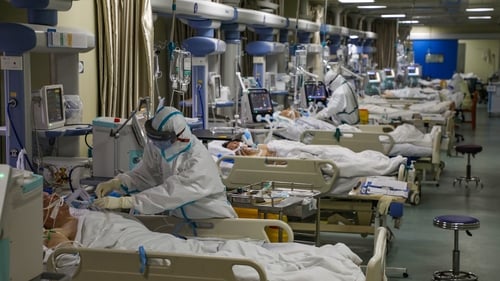
Experts say fake news could worsen disease outbreaks
The increase in fake news could be making disease outbreaks worse, experts say.
Researchers focused on the flu, monkeypox and norovirus across two studies.
However they say their findings could also be useful for dealing with Covid-19, the strain of coronavirus that originated in Wuhan.
They suggest efforts to stop people sharing fake news, misinformation and harmful advice on social media could save lives.
Scientists say the concern that fake news might be used to distort political processes or manipulate financial markets is well established.
However, the possibility that misinformation spread could harm human health, especially during the outbreak of an infectious disease, is less studied.
Covid-19 expert Paul Hunter and Julii Brainard, both from the University of East Anglia's Norwich Medical School, tested the effect of sharing dangerously wrong information on human health during a disease outbreak.
Professor Hunter said: "Fake news is manufactured with no respect for accuracy, and is often based on conspiracy theories.
"Worryingly, research has shown that nearly 40% of the British public believe at least one conspiracy theory, and even more in the US and other countries.
"When it comes to Covid-19, there has been a lot of speculation, misinformation and fake news circulating on the internet - about how the virus originated, what causes it and how it is spread.
"Misinformation means that bad advice can circulate very quickly - and it can change human behaviour to take greater risks."
He added: "Examples of risky behaviour during infectious disease outbreaks include not washing hands, sharing food with ill people, not disinfecting potentially contaminated surfaces, and failing to self-isolate.
"Worryingly, people are more likely to share bad advice on social media, than good advice from trusted sources such as the NHS, Public Health England or the World Health Organisation."
Researchers created theoretical simulations which took into account studies of real behaviour, how different diseases are spread, incubation periods and recovery times.
They also looked at the speed and frequency of social media posting and real-life information sharing.
Published in the Revue Depidemiologie Et De Sante Publique journal, the studies also took into account how a distrust of authorities is closely linked to the tendency to believe in conspiracy theories.
Researchers investigated strategies to fight fake news, such as drowning bad information with good information and "immunising" people against bad information though better education.
Dr Brainard said:"We found that misinformation during epidemics of infectious disease could make those outbreaks more severe."
The first study focused on the flu, monkeypox and norovirus.
Researchers found reducing the amount of harmful advice being circulated from 50% to 40% mitigated the influence of bad advice on the outcomes of a disease outbreak.
Dr Brainard added: "Our second study, which focused on norovirus, showed that even if 90% of the advice is good, some disease will still circulate.
"In our second study, we were also interested in the 'herd immunity' levels required to 'immunise' people against fake news.
"The modelling suggests that any 'immunity' against bad advice reduces outbreak impacts."
However she cautioned that the studies were based on simulations, and that strategies to fight fake news need to be tested in real world settings.
The research was part-funded by the National Institute for Health Research (NIHR) Health Protection Research Units in Emergency Preparedness and Response and Gastrointestinal Infections in partnership with Public Health England.